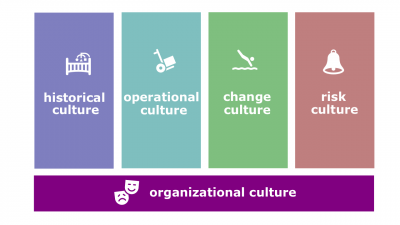Difference between revisions of "Organizational culture"
(→Definitions) |
|||
| Line 13: | Line 13: | ||
According to the [[Corporate Strategy by Lynch (4th edition)]], | According to the [[Corporate Strategy by Lynch (4th edition)]], | ||
| − | :[[ | + | :[[Organizational culture]]. The set of beliefs, values and learned ways of managing in an individual organization. Note that it is important to distinguish this from national cultures. |
According to the [[Strategic Management by David and David (15th edition)]], | According to the [[Strategic Management by David and David (15th edition)]], | ||
:[[Organizational culture]]. A pattern of behavior developed by an organization over time as it learns to cope with its problem of external adaptation and internal integration, and that has worked well enough to be considered valid and to be taught to new members as the correct way to perceive, think, and feel in the firm. | :[[Organizational culture]]. A pattern of behavior developed by an organization over time as it learns to cope with its problem of external adaptation and internal integration, and that has worked well enough to be considered valid and to be taught to new members as the correct way to perceive, think, and feel in the firm. | ||
According to the [[HRBoK Guide]], | According to the [[HRBoK Guide]], | ||
:[[Corporate culture]]. The beliefs and behaviors of an organization. The values, language, rules, procedures, expectations, and processes that affect how employees of an organization think, act, and view the world. | :[[Corporate culture]]. The beliefs and behaviors of an organization. The values, language, rules, procedures, expectations, and processes that affect how employees of an organization think, act, and view the world. | ||
| − | |||
==Parts== | ==Parts== | ||
Revision as of 16:00, 24 April 2021
Organizational culture (alternatively known as corporate culture; hereinafter, the Culture) is a system of the shared meaning, mental models, principles, traditions, values, and ways of doing things held by members of the organization that influence the way organizational members act and that distinguish the organization from other organizations.
Definitions
According to Organizational Behavior by Robbins and Judge (17th edition),
- Organizational culture. A system of shared meaning held by members that distinguishes the organization from other organizations.
According to Management by Robbins and Coulter (14th edition),
- Organizational culture. The shared values, principles, traditions, and ways of doing things that influence the way organizational members act and that distinguish the organization from other organizations.
According to Marketing Management by Keller and Kotler (15th edition),
- Corporate culture. The shared experiences, stories, beliefs, and norms that characterize an organization.
According to the Corporate Strategy by Lynch (4th edition),
- Organizational culture. The set of beliefs, values and learned ways of managing in an individual organization. Note that it is important to distinguish this from national cultures.
According to the Strategic Management by David and David (15th edition),
- Organizational culture. A pattern of behavior developed by an organization over time as it learns to cope with its problem of external adaptation and internal integration, and that has worked well enough to be considered valid and to be taught to new members as the correct way to perceive, think, and feel in the firm.
According to the HRBoK Guide,
- Corporate culture. The beliefs and behaviors of an organization. The values, language, rules, procedures, expectations, and processes that affect how employees of an organization think, act, and view the world.
Parts
Every Culture can be divided in four parts: (1) historical organizational culture or the culture envisioned by the founders and others that is no longer executed, (2) operational culture or the culture exercised by an enterprise today for its operations, (3) change culture or the culture related to change in the enterprise, and (4) risk culture or the culture related to handling risks.
Related concepts
- Strong organizational culture. An organizational culture in which the key values are intensely held and widely shared.
- Positive organizational culture. An organizational culture that emphasizes building on employee strengths, rewards more than punishes, and emphasizes individual vitality and growth.
- Organizational subculture. A miniculture within an organization, typically defined by department designations and geographical separation.
